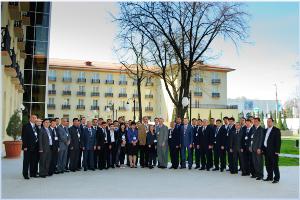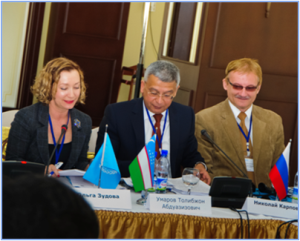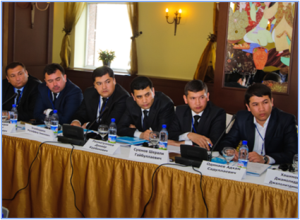Central Asian Prosecutors Discussed International and National Standards
 The training course entitled 'International and National Standards of Professional Responsibility, Essential Duties and Rights of Prosecutors', held by UNODC from the 24
th to the 25
th of March in Tashkent, has helped to realise the objectives of the national anti-corruption project UZBT65 "Strengthening anti-corruption measures in Uzbekistan". This has been achieved by giving over forty one prosecutors from all parts of Uzbekistan the opportunity to discuss the complex roles, rights and responsibilities of prosecutors in both their professional and personal lives.
The training course entitled 'International and National Standards of Professional Responsibility, Essential Duties and Rights of Prosecutors', held by UNODC from the 24
th to the 25
th of March in Tashkent, has helped to realise the objectives of the national anti-corruption project UZBT65 "Strengthening anti-corruption measures in Uzbekistan". This has been achieved by giving over forty one prosecutors from all parts of Uzbekistan the opportunity to discuss the complex roles, rights and responsibilities of prosecutors in both their professional and personal lives.
Adapted to the course's restricted timeframe, the agenda began with an outline of the international and national standards of each participating country as related to prosecutorial activities and conduct. It then focused on an analysis of the six professional responsibilities, duties and rights of prosecutors: professional conduct, independence, impartiality, the role of prosecutors in criminal proceedings, international cooperation and the importanc e of empowering prosecutors to facilitate responsible decision-making.
In addition to topics concerning a prosecutor's behaviour in professional situations,
 the training course also addressed how they should conduct themselves in their personal and social lives. Related topic s included rules concerning how a prosecutor should approach social events and meetings, restrictions to secondary work, and the need to prevent nepotism and bias. Other topics included the ways that legislative reforms in Russia, Uzbekistan, United States and Bosnia and Herzegovina have affected prosecutors, the complexities surrounding evidence and extradition, and the need to empower prosecutors through sufficient pay and legal protection.
the training course also addressed how they should conduct themselves in their personal and social lives. Related topic s included rules concerning how a prosecutor should approach social events and meetings, restrictions to secondary work, and the need to prevent nepotism and bias. Other topics included the ways that legislative reforms in Russia, Uzbekistan, United States and Bosnia and Herzegovina have affected prosecutors, the complexities surrounding evidence and extradition, and the need to empower prosecutors through sufficient pay and legal protection.
To complement the information provided during the course's discussions, UNODC representatives and participating international experts also developed a "Manual on inte
 rnational and national standards of professional responsibility, rights and duties of prosecutors". This document contained relevant national legislation, case studies and international documents and resolutions, and was distributed to participants in both a paper and electronic format. Both the insight provided by trainers and the information in the manual were highly valued by all the participants. They noted that the information was of actual importance, and was presented in a highly professiona l manner.
rnational and national standards of professional responsibility, rights and duties of prosecutors". This document contained relevant national legislation, case studies and international documents and resolutions, and was distributed to participants in both a paper and electronic format. Both the insight provided by trainers and the information in the manual were highly valued by all the participants. They noted that the information was of actual importance, and was presented in a highly professiona l manner.
The Head of Training courses under Prosecutor General's Office of Uzbekistan, Mr. Tolibjon Umarov, expressed his gratification for the organization of a very useful practical training course, while assuring that the attendees would share their learnt knowledge with their colleagues and students.